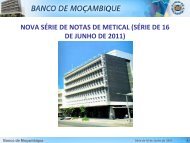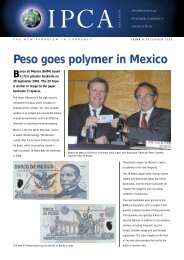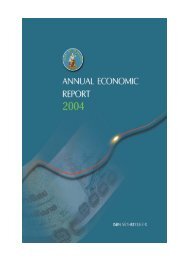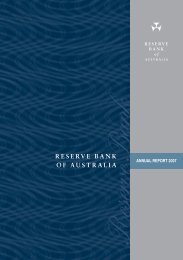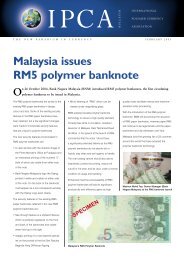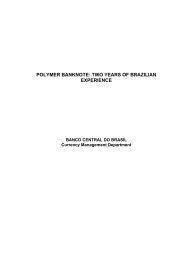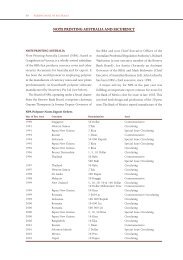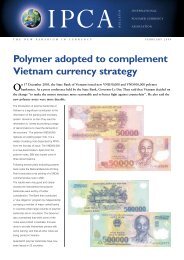ANNUAL REPORT 2008 - Polymer Bank Notes of the World
ANNUAL REPORT 2008 - Polymer Bank Notes of the World
ANNUAL REPORT 2008 - Polymer Bank Notes of the World
Create successful ePaper yourself
Turn your PDF publications into a flip-book with our unique Google optimized e-Paper software.
EURIBOR (euro interbank <strong>of</strong>fered rate): <strong>the</strong> rate at which a prime bank is willing to lend fundsin euro to ano<strong>the</strong>r prime bank, as reported by a panel <strong>of</strong> contributing banks, computed daily forinterbank deposits with different maturities <strong>of</strong> up to 12 months.Euro area: <strong>the</strong> area encompassing those Member States which have adopted <strong>the</strong> euro as <strong>the</strong> singlecurrency in accordance with <strong>the</strong> Treaty and in which a single monetary policy is conducted under<strong>the</strong> responsibility <strong>of</strong> <strong>the</strong> Governing Council <strong>of</strong> <strong>the</strong> European Central <strong>Bank</strong>. The euro areacurrently comprises Belgium, Germany, Ireland, Greece, Spain, France, Italy, Cyprus, Luxembourg,Malta, <strong>the</strong> Ne<strong>the</strong>rlands, Austria, Portugal, Slovenia, Slovakia and Finland.European Central <strong>Bank</strong> (ECB): <strong>the</strong> ECB lies at <strong>the</strong> centre <strong>of</strong> <strong>the</strong> Eurosystem and <strong>the</strong> EuropeanSystem <strong>of</strong> Central <strong>Bank</strong>s (ESCB) and has its own legal personality in accordance with <strong>the</strong>Treaty (Article 107(2)). It ensures that <strong>the</strong> tasks conferred upon <strong>the</strong> Eurosystem and <strong>the</strong> ESCB areimplemented ei<strong>the</strong>r through its own activities or through those <strong>of</strong> <strong>the</strong> NCBs, pursuant to <strong>the</strong> Statute<strong>of</strong> <strong>the</strong> ESCB. The ECB is governed by <strong>the</strong> Governing Council and <strong>the</strong> Executive Board, and, as athird decision-making body, by <strong>the</strong> General Council.European Monetary Institute (EMI): a temporary institution established at <strong>the</strong> start <strong>of</strong> StageTwo <strong>of</strong> Economic and Monetary Union on 1 January 1994. It went into liquidation following <strong>the</strong>establishment <strong>of</strong> <strong>the</strong> European Central <strong>Bank</strong> on 1 June 1998.European System <strong>of</strong> Accounts 1995 (ESA 95): a comprehensive and integrated system <strong>of</strong>macroeconomic accounts based on a set <strong>of</strong> internationally agreed statistical concepts, definitions,classifications and accounting rules aimed at achieving a harmonised quantitative description <strong>of</strong> <strong>the</strong>economies <strong>of</strong> <strong>the</strong> EU Member States. The ESA 95 is <strong>the</strong> Community’s version <strong>of</strong> <strong>the</strong> world System<strong>of</strong> National Accounts 1993 (SNA 93).European System <strong>of</strong> Central <strong>Bank</strong>s (ESCB): composed <strong>of</strong> <strong>the</strong> European Central <strong>Bank</strong> (ECB)and <strong>the</strong> NCBs <strong>of</strong> all 27 EU Member States, i.e. it includes, in addition to <strong>the</strong> members <strong>of</strong> <strong>the</strong>Eurosystem, <strong>the</strong> NCBs <strong>of</strong> those Member States that have not yet adopted <strong>the</strong> euro. The ESCB isgoverned by <strong>the</strong> Governing Council and <strong>the</strong> Executive Board <strong>of</strong> <strong>the</strong> ECB, and, as a third decisionmakingbody <strong>of</strong> <strong>the</strong> ECB, by <strong>the</strong> General Council.Eurosystem: <strong>the</strong> central banking system <strong>of</strong> <strong>the</strong> euro area. It comprises <strong>the</strong> European Central<strong>Bank</strong> and <strong>the</strong> NCBs <strong>of</strong> <strong>the</strong> Member States that have adopted <strong>the</strong> euro.Excessive deficit procedure: <strong>the</strong> provision set out in Article 104 <strong>of</strong> <strong>the</strong> Treaty and specified inProtocol No 20 on <strong>the</strong> excessive deficit procedure requires EU Member States to maintain budgetarydiscipline, defines <strong>the</strong> criteria for a budgetary position to be considered an excessive deficit andregulates steps to be taken following <strong>the</strong> observation that <strong>the</strong> requirements for <strong>the</strong> budgetary balanceor government debt have not been fulfilled. Article 104 is supplemented by Council Regulation(EC) No 1467/97 <strong>of</strong> 7 July 1997 on speeding up and clarifying <strong>the</strong> implementation <strong>of</strong> <strong>the</strong> excessivedeficit procedure (as amended by Council Regulation (EC) No 1056/2005 <strong>of</strong> 27 June 2005), whichis one element <strong>of</strong> <strong>the</strong> Stability and Growth Pact.Executive Board: one <strong>of</strong> <strong>the</strong> decision-making bodies <strong>of</strong> <strong>the</strong> European Central <strong>Bank</strong> (ECB).It comprises <strong>the</strong> President and <strong>the</strong> Vice-President <strong>of</strong> <strong>the</strong> ECB and four o<strong>the</strong>r members appointed bycommon accord by <strong>the</strong> Heads <strong>of</strong> State or Government <strong>of</strong> <strong>the</strong> Member States that have adopted <strong>the</strong>euro.278 ECBAnnual Report<strong>2008</strong>



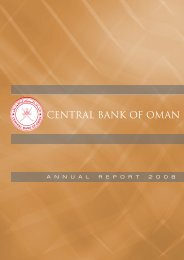
![KNOW YOUR NEW GIBRALTAR BANKNOTES - [Home] bThe/b](https://img.yumpu.com/50890985/1/184x260/know-your-new-gibraltar-banknotes-home-bthe-b.jpg?quality=85)
![PAPUA NEW GUINEA - [Home] - Polymer Bank Notes of the World](https://img.yumpu.com/49758743/1/190x143/papua-new-guinea-home-polymer-bank-notes-of-the-world.jpg?quality=85)

